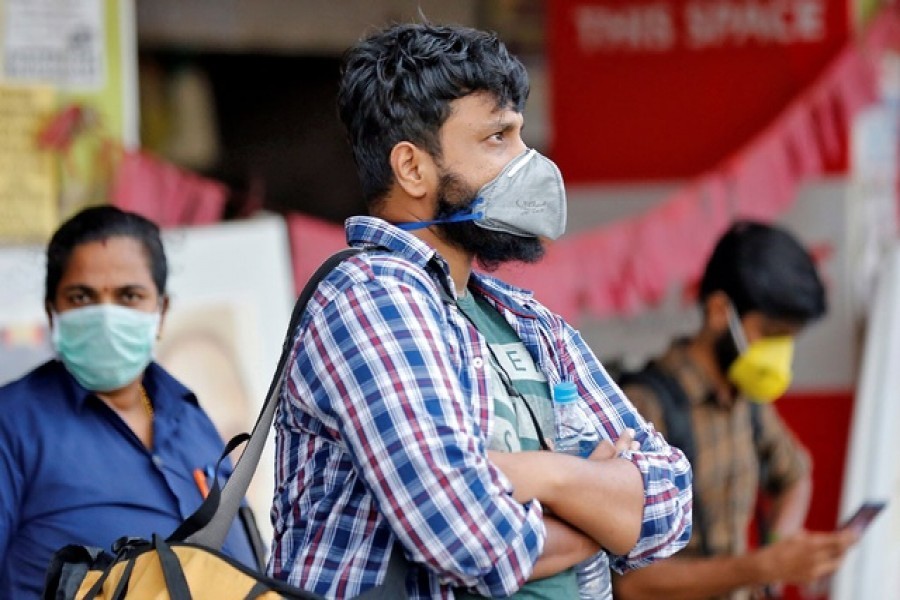With the rate of Covid-19 infection plummeting below 5.0 per cent in the country, the general notion is that the virus is on its way out. But the latest surge ---although not alarming --- in many of the European countries including Britain and Germany and the World Health Organisation (WHO) prediction should give no cause for relaxation. The WHO indicates that an additional 236,000 people may die of the disease in Europe by December 1, 2021. Already 1.3 million deaths have been recorded in that continent. Right now the outbreak of the disease has been reported from nations that were hardly affected by the disease when Europe was ravaged by it. Kosovo, Montenegro, Georgia and Slovenia are a few such countries now facing an unusual spike of Covid-19. Some South-east Asian nations are experiencing modest spikes. Seychelles, the world's most vaccinated country, has to reinstate restrictions after rises in cases.
True, both deaths and cases of infection have been dropping in Bangladesh since the first week of August. More importantly, the rate of infection has been registered below 5.0 per cent for two consecutive days (September 21 and 22). But it may give a mistaken impression if the more than 10 per cent rate in some parts of the country is not taken into account. Particularly worrying is the fact that people have started behaving as if the deadly virus has departed for good. The majority now do not wear masks let alone maintaining physical distancing and other health protocols.
In this connection, a new study carried out by the University of Maryland School of Public Health can give an insight into the way the virus spreads. The study finds that the virus is airborne and its Alpha variant spreads in the air 43-100 per cent more than the original strains. The Delta variant is even more contagious and both variants are 'better at travelling through the air', claims Dr. Don Milton, professor of environmental health. The research team suggested loose-fitting cloth and surgical masks to avoid contamination.
That SARS-COV-2, irrespective of their strains, spread through air was revealed by other studies but there was an attempt to suppress this important information. If it spreads like the germs of tuberculosis, it should have been told point blank. This would have prompted more people to wear masks. Many of those people reluctant to wear masks argue that they have vaccine shots. No doubt, vaccinated people are better armed against Covid-19 but it is no guarantee that they would not get infected by the Delta variant. Unless they have other chronic diseases like diabetes, kidney, liver and heart complications, they may even get well at home without seeking treatment at hospitals.
However, if they exhale the virus in the open air, unvaccinated people--- the number of which is many times more than who received jabs--- can be put at severe risk. This is why there is no alternative to masks in the first place no matter whether one is infected with the virus or uninfected and quite healthy. A vaccinated but infected patient must do so in order to stop infecting others and the healthy uninfected must do so to secure his or her own safety.
According to the WHO, continuous decline in cases and deaths for three consecutive weeks and the rate of infection staying below 5.0 per cent are an indication that a country is well in control of the disease. Now the country has registered drops in cases for consecutive seven weeks and the number of deaths has also come down for six weeks. If this news is heartening, it must be noted that at the time Indian daily caseloads were in the region of 40,000, Bangladesh registered a figure only above 2,000 and still the rate was around 15 per cent as against India's a little over 2.0 per cent.
That was the time when the WHO claimed that India had become accustomed to living with the pandemic. In other words, that country with the second largest population size in the world came to terms with the pandemic-induced new normal. Now the question is, has Bangladesh also become accustomed to living with the pandemic? It seems, the rate of cases has to drop even further ---almost to half ---before the country qualifies to achieve the feat.
However, the status can be improved dramatically if people can be vaccinated on a massive scale. The authorities once gave it to understand that supply of vaccines by the end of September would be enough to go for yet another mass inoculation. Unfortunately, the health minister could not inform when this would be done. There was also talk of vaccinating more than half of the population by the next December. Indeed, vaccination is the key to securing the required immunity to this deadly virus. Coronavirus may not go at all and most likely remain as one of the types of flu but if at least 70 per cent of the population get vaccinated, herd immunity can be achieved. If hundred per cent of the population gets vaccinated, the threat almost disappears. But there is the problem of vaccinating children from a few months to 17 years old.
Here the problem is particularly sensitive because school students mostly belong to the 5.0-16 years old group. Now that schools have opened and SSC and HSC candidates are attending classes, the situation needs close monitoring. A reputed school and college in Mohammadpur arranged final examinations for class XI immediately after reopening. Three students with fever stopped appearing for the exam after the first day. Another student running fever continued exam because of the fear that failing to attend exam may disallow promotion to class XII. This may be the particular institution's decision but such incidents may prove frustrating for students and even defeat the purpose of keeping educational institutions open. If fever is simple fever, no harm but what if it turns out to be Covid-19!


